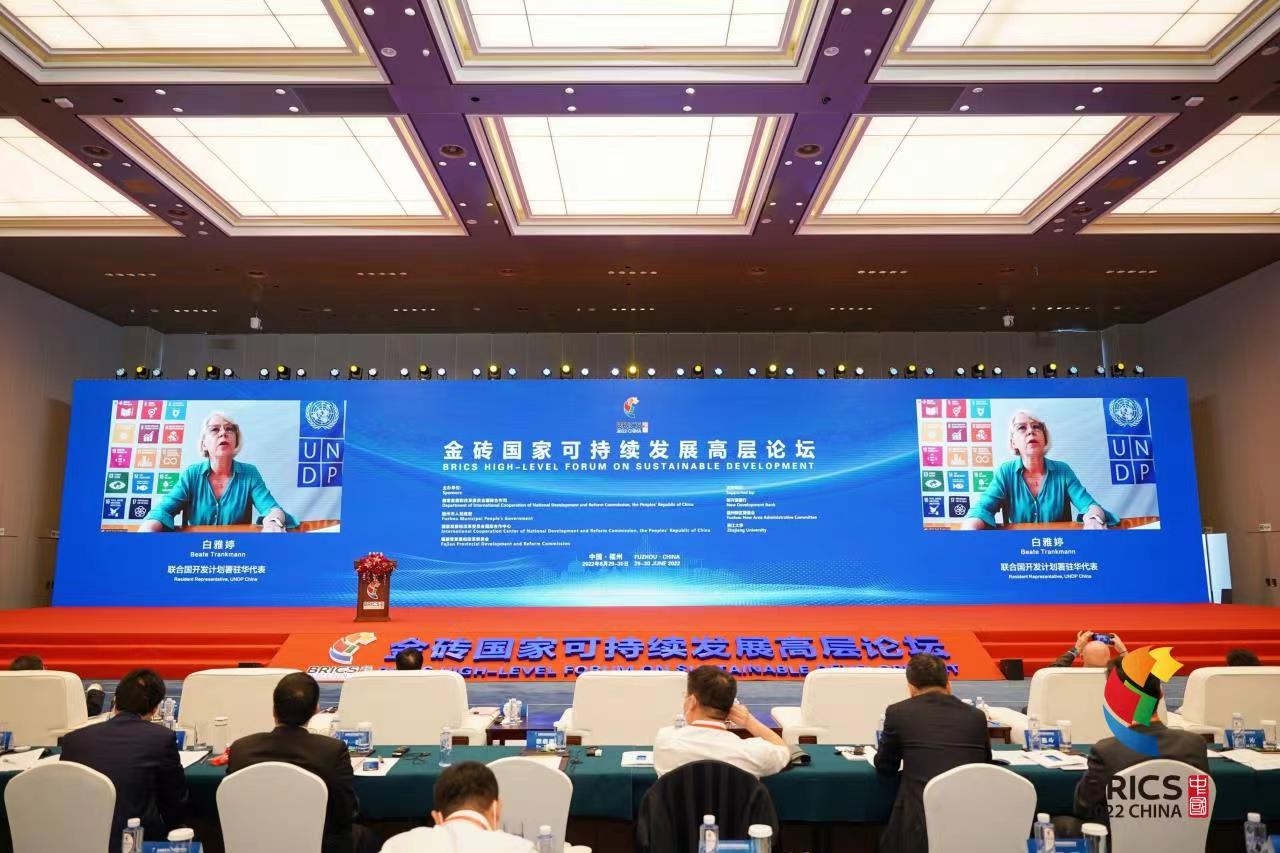Keynote Speech by Ms. Beate Trankmann at the BRICS High-level Forum on Sustainable Development
June 30, 2022

Ms Beate Trankmann, Resident Representative at UNDP China, delivers a keynote speech at the BRICS Forum on Sustainable Development
Good morning! 大家上午好!
I am delighted to join today’s event addressing climate change – the greatest challenge to life on earth.
The current outlook is catastrophic. We are currently on track to overshoot the 1.5C safe limit set in Paris by more than double. This would leave much of our planet uninhabitable. One billion people could be displaced, with countries and cities, including Shanghai, underwater by the end of this century – hitting those most vulnerable, hardest.
Climate change also contributes to the collapse of nature, on which we – and our climate – depend. More than one million species face extinction, many within decades… While the University of Chicago warns air pollution – fueled by emissions – is now the top, external reason why people die. [1]
Time is against us. We have only a few years left, to avoid the ‘three-degree world’. To prevent the worst effects of climate change and its related crises, global carbon emissions must halve by 2030… and reach net zero, by 2050.
For that to happen, we are moving dangerously slowly… But together, we can still win this race.
Turning ambition into action will test all nations.
Firstly, international cooperation is crucial. Because climate change transcends borders. To avert climate catastrophe, countries must make concrete commitments to rapidly decarbonize at COP27 … And agree on an ambitious and targeted post-2020 global biodiversity framework, at COP-15, backed up by the necessary finance.
Accounting for more than two-fifths of the world's population and about one fifth of global GDP, BRICS are key to these efforts. So, we are pleased to see their recently reaffirmed commitment to fully implement the Paris Agreement.
China’s efforts will be critical to this. In 2020, President Xi Jinping pledged to peak carbon before 2030 and achieve carbon neutrality before 2060. This has game-changing potential. Given the size of its economy, China is a top emitter. But it also leads in many green energy sectors, including solar and hydrogen.
We also welcome China’s pledge to support other developing countries in pursuing low-carbon energy and stop building new, coal-fired power plants abroad. With UNDP assistance, China is already sharing its green technology and experiences, including through South-South Cooperation. Such green tech collaborations can play a vital part in helping countries to meet their climate targets, in time.
Secondly, to fund the development and transfer of green tech, we must expand and incentivize sustainable finance. The global financing gap to meet the SDGs by 2030 soared during the pandemic, to $100 trillion. [2] To overcome that, at least 10 percent of global GDP every year must be redirected towards clean energy, conservation and other vital areas. Governments can enable this by standardizing green finance rules; making environmental disclosures mandatory and incentivizing sustainable investments with tax cuts. New financing tools, like green bonds must also be strengthened. In China, UNDP is working with partners on standards of SDG bonds and taxonomies.
This makes clear economic sense. A low-carbon economy could create more than 10 trillion dollars in new business value every year by 2030, adding 395 million jobs worldwide. [3]
Finally, enabling a just, low-carbon transition that leaves no one behind is key to realising climate pledges, and every Sustainable Development Goal (SDG), including ending poverty. UNDP works with communities in China and globally to turn environmental protection into livelihood opportunities, in areas like eco-tourism and agriculture. Empowering vulnerable people in climate action and conservation, as well as ensuring they benefit, is essential for effective and enduring nature protection.
UNDP promotes an inclusive, nature- & climate-positive transitions through our evidence-based policy work and global networks. We stand ready to offer these resources so BRICS countries and the world can reach net-zero, while it’s still possible.
Forums such as this are important in facilitating international policy dialogue and knowledge sharing among BRICS countries and beyond, as well as forging coalitions for action. I thank our hosts – the NDRC, ICC and Fuzhou Government – for organizing this event and inviting me to contribute.
We have the platforms, the finance and the innovation to succeed and leave no one behind, in this historic sprint to save the planet for our survival... IF we act together, and act today.
Thank you! 谢谢!
[1] Energy Policy Institute at the University of Chicago (EPIC), June 2022, Air Quality Life Index (AQLI) Annual Update: https://aqli.epic.uchicago.edu/wp-content/uploads/2022/06/AQLI_2022_Report-Global.pdf
** Note: pages 6-7 show air pollution surpasses smoking, alcohol, conflict and terrorism as the top external cause of death worldwide.
[2] Reuters (17 Sep 2021), UN faces $100 trillion shortfall in fight against climate change, inequality https://www.reuters.com/business/sustainable-business/world-needs-spend-another-100-trln-un-fight-against-global-woes-report-2021-09-17/
[3] World Economic Forum (Feb 2022), Scaling Investments in Nature: the Next Critical Frontier For Private Sector Leadership, White Paper https://www3.weforum.org/docs/WEF_Scaling_Investments_in_Nature_2022.pdf

 Locations
Locations




